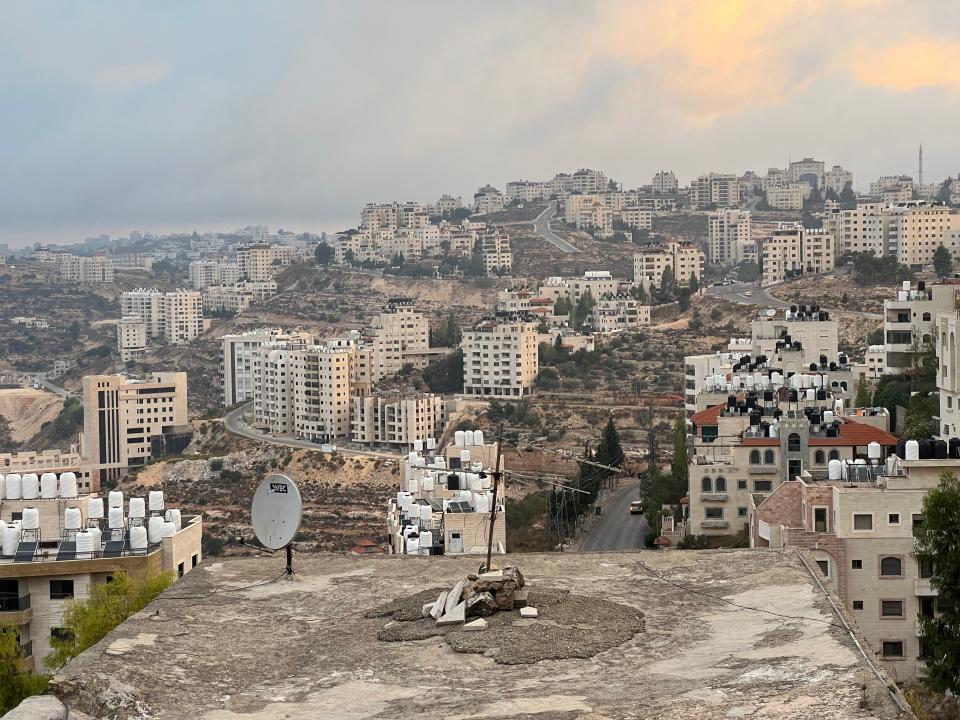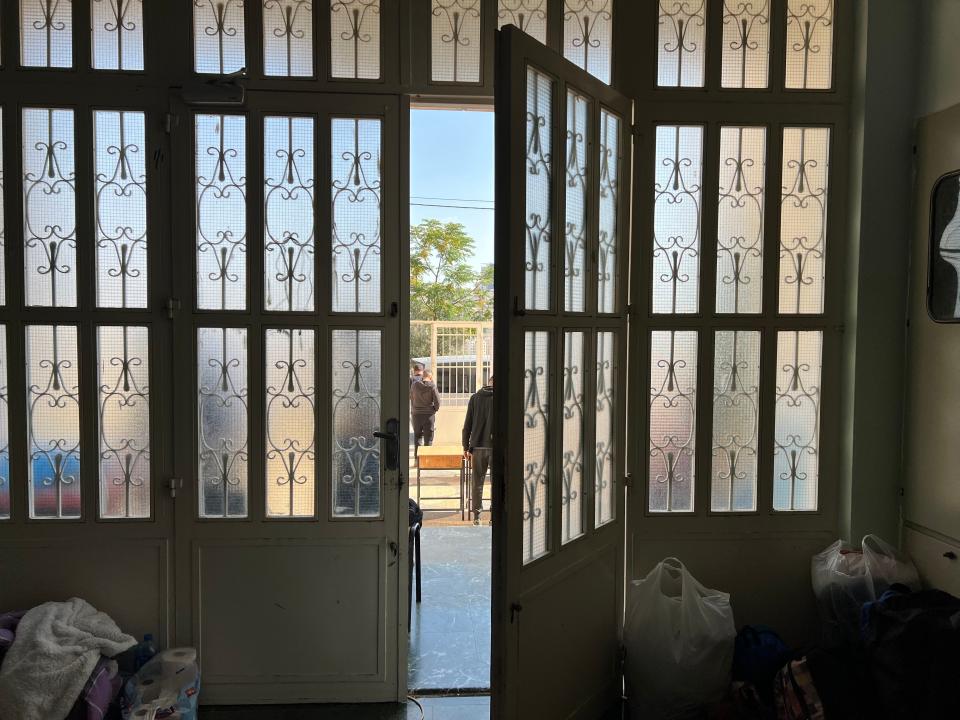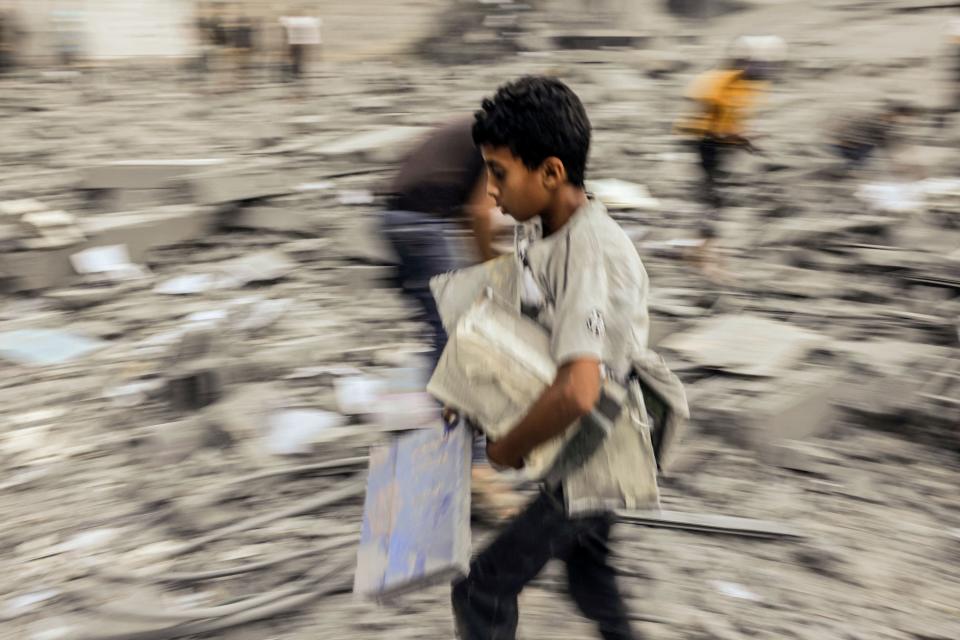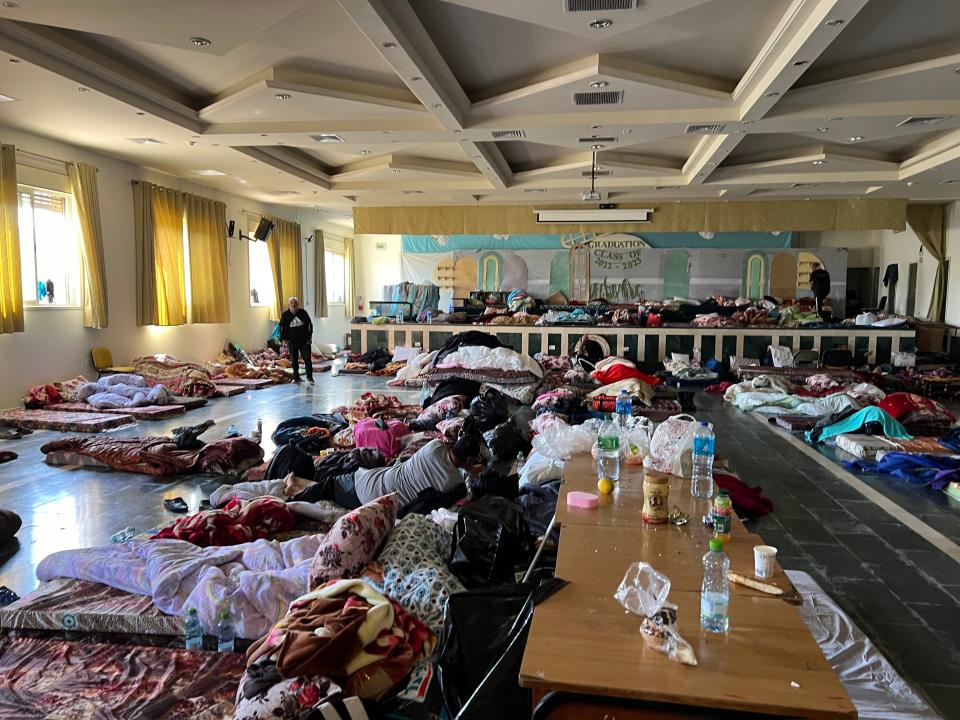'I won't condemn Hamas': Some Palestinians find it hard to denounce attacks on Israel
RAMALLAH, West Bank − Farhat is doing his best to accept that his family may be severely injured or even killed in the coming days.
A week ago the electrician was detained by Israeli police as he was getting ready for work in Ashkelon, a city in southern Israel close to the Gaza Strip − where he's from and where his family remain.
He says he was blindfolded, his wrists were bound and he was falsely accused of killing Israeli women and children. Eventually, he was put on a bus and deported to the West Bank, the landlocked area that forms the main bulk of the Palestinian territories.
Timeline of conflict: Why the 2023 Israeli-Palestinian fighting is among the most brutal in years
As Israel's military operation to root out Hamas and its members who massacred civilians on the country's southern border on Oct. 7 gathers momentum, its forces are gradually reducing whole neighborhoods in Gaza to rubble. Water, food, power and medicines are running out. Morgues are overflowing.
Palestinians, international aid organizations and reports from hospitals in Gaza say that more than 47 families consisting of 500 civilians in Gaza have been wiped out by Israel's bombing campaign. On Tuesday, Hamas blamed Israel for an airstrike on a hospital in Gaza that killed at least 500 people. And because of this, their own rough treatment at the hands of Israeli authorities and their long, violent and bitter shared history with the country, Palestinians like Farhat and others in the wider community are finding it hard to denounce the attacks on Israel even though they say they don't approve of violence against civilians.

"Killing anybody is wrong," said a Palestinian man chatting with friends Saturday in downtown Ramallah.
"But imagine you live somewhere and I come and lock you in your house. I control everything that comes in and out of your house. Occasionally, I come and beat you up. Eventually you're going to resist and start fighting back with whatever you have," he said. With the Hamas attacks, "that's what's happening."
Israel contends it controls access to Gaza for security reasons.
"I am powerless to help them, and for every 10 times I try to reach them on the phone, I get through maybe once," Farhat, 60, said Saturday, speaking about his wife, 12 children and "many grandchildren" on the grounds of a school in Ramallah. That's where 130 Palestinian workers from Gaza, deported from Israel alongside him, were being temporarily sheltered in a large hall. USA TODAY could not independently verify their accounts, but all had similar stories of detention and displacement. The Israel Prison Service did not return a request for comment.
The full names of the men at the school spoken to for this story are being withheld, at their request, for their own safety. Other names of Palestinians are being withheld to limit possible damage to their professional reputations.
Hamas attacks Israel: How police and military are still trying to find the gunmen
'Where can we go? We are all under attack'
The school hall in Ramallah was filled with floor mats arranged in neat rows, rumpled sleeping bags, discarded plastic water bottles and scores of pacing men − only men − who said they simply had no idea how they could help themselves or their families, let alone reunite with them.
"I don't care if I die," said Imad, 58, another Palestinian electrician from Gaza who was deported to the West Bank with Farhat. He has eight children and helps care for several more from a son who died a few years ago after a battle with cancer. Farhat said he is never certain whether his family members are alive or dead.
Hundreds of thousands of people are fleeing to the south of Gaza, close to Egypt, with whatever they can carry and by whatever means of transportation they can find. With fuel scarce, some are using horses and carts.
The Palestinian health ministry says more than 2,700 Palestinians have been killed since the fighting erupted, and fatalities are occurring at a rate of every five minutes amid Israeli airstrikes.
Almost 10,000 Gazans, half of them women and children, have been injured. As many as 50,000 pregnant women are not able to access basic health services, according to the U.N. So far, Israel has not allowed aid in. It says it wants Hamas to release captives first. Egypt has been unwilling to open its border to fleeing Gazans.

"Where can we go? We are all under attack," said Imad's wife, Hayat, when reached by phone Saturday in Khan Younis, a city in the south of Gaza. The city has ballooned to more than 1 million people as Israel's military has warned Palestinian civilians to leave northernGaza ahead of an expected ground offensive targeting Hamas.
Khan Younis usually has a population of about 400,000 people.
'They cursed us, treated us like animals'
Many Palestinians at the school in Ramallah drew attention to their bruised wrists.
The bruises are the result, they said, of zip ties placed on them by Israeli police. For years Israel has adopted a controversial policy of "administrative detention," which allows the authorities to detain Palestinians of all ages without trial and under allegations it keeps secret. Israel says the tactic is necessary to contain dangerous militants whom the government believes could be terrorists.
Rights groups argue the practice amounts to extrajudicial detention and punishment.
Farhat and Imad said police refused to let them use the bathroom while they were being held.
They showed photos on their phones, taken by eyewitnesses, of what appeared to be them kneeling while blindfolded in front of police and other Israeli security services. They said that the younger men among them were beaten, though they also said that some Israeli soldiers sought to intervene to stop it.
"They cursed us, treated us like animals and accused us of killing (Israeli) children − of being responsible for (the attacks in Israel) and what's happening in Gaza," Farhat said.
"'Piss in your pants if you need to,' the Israeli soldiers told us," Imad said.

A third man at the school who was listening to Imad speak said he and his wife, who is in Gaza, have decided it would be best for her die in their own home rather than evacuate to the south.
"There is no safe place in Gaza," he said. "Every place is targeted. The worst thing about this whole experience for me is that I am here but my mind is back there."
Earlier that Saturday, word arrived that the entire family of another Palestinian worker staying at the school had been killed in an Israeli bombardment. He got so emotional and enraged he was taken to a medical clinic to be given sedatives.
Minors shot in the head, chest, abdomen
The school where the workers were staying serves 800 children from kindergarten up to high school.
Its director said some parents were concerned that the men's presence could cause it to be raided by Israel's military or attacked by vigilante Jewish settlers in the West Bank seeking to exact some kind of revenge for the 1,400 Israelis killed when Hamas crossed the border from Gaza to Israel to attack and kidnap civilians and soldiers.
The Israeli settlers live in West Bank communities that are illegal under international law. These settlements are built on Palestinian lands in a Palestinian-governed area that Israeli's military has occupied since it won a war in 1967 with Arab countries.
"Nowadays nobody can tell what these settlers will do," the director said, referring to the communities that have been expanded under Prime Minister Benjamin Netanyahu's government and are opposed by some Israelis.
"They seem free to do, and kill, whoever they like."
Since the outbreak of the war between Israel and Hamas more than a week ago, at least 56 Palestinians have been killed and more than 1,100 have been wounded in the West Bank in attacks on them by settlers and in confrontations with Israel's military, according to the Palestinian Ministry of Health.

Some of those killed, according to Palestinian activists, included minors shot in the head, chest and abdomen.
On Friday alone, traditionally a day of protest, at least 14 Palestinians were killed in the West Bank in clashes between Israeli forces and Palestinians near roads leading to checkpoints. Some were killed by settlers.
A refusal to condemn Hamas
Many of the Palestinians USA TODAY encountered in Ramallah and surrounding West Bank areas said that while they reject the idea of violence against civilians, Israelis or otherwise, they do not believe or feel it is their responsibility to forcefully condemn or repudiate the Hamas attacks on Israeli civilians.
Many also don't view Hamas as terrorist organization, as the U.S. and European Union designate it. They see the group as acting in self-defense to Israeli military actions.
Hamas is the de facto ruler of Gaza.
This refusal to condemn Hamas − a group that believes Israel should not exist − has angered the Israeli public and large swaths of international opinion as accounts and gory details have emerged of executions and kidnappings committed by Hamas against Israeli civilians. Among the kidnapped are elderly women and small children. Israel estimates that about 200 people, some of them police and soldiers, are being held hostage by Hamas. Fourteen Americans remain unaccounted for, though it is unclear how many may be held hostage.
An American advocated for Palestinians: Then Hamas came
Human rights groups say they are tracking evidence of war crimes committed by both sides, with Israel's indiscriminate military campaign and "complete siege of Gaza" − its withholding of water, food, electricity and fuel − amounting to a "collective punishment" on Palestinian civilians, according to the United Nations. Both Israel and Hamas insist they are operating within the confines of international law.
“We are at war. We are defending our homes," Israeli President Isaac Herzog said at a media briefing Friday. “That’s the truth. And when a nation protects its home, it fights. And we will fight until we break their backbone.”
In an interview with the Economist magazine last week, Moussa Abu Marzouk, a senior Hamas leader, said that his group's operation in Israel targeted only "military posts."
The official news agency of the Palestinian Authority, which exercises civilian control over the West Bank, published comments Sunday by President Mahmoud Abbas that criticized Hamas for its actions. It later removed a reference to Hamas without providing an explanation.
On Monday, the news agency published comments from Abbas in which he rejected the killing of civilians on both sides and called for the release of civilians, prisoners and detainees on both sides. He did not mention Hamas.
'I won't condemn Hamas'
On the outskirts of Ramallah, a 25-year-old graduate student was taking a break from her studies at a coffee shop in an upscale business park. She's studying for a master's degree in international law and wants to specialize in defending the human rights of Palestinians.
She was born in Chicago and holds dual citizenship.
She said there are a multitude of reasons why Palestinians like her are finding it hard to criticize Hamas.
Among them: Palestinians feel they have lived for decades in a world where attacks on them by Israelis have not been given similar public censure; millions of Palestinians lack basic rights as a result of Israel's military occupation, which imposes onerous restrictions on their movement, controls their water resources, and subjects them to forced evictions, police harassment, arbitrary detention and numerous other everyday indignities; Israeli transgressions of international law with its settlements and military actions are shrugged off; and Israel has slowly taken more Palestinian land while ministers in Netanyahu's government have openly called for ethic cleansing against Palestinian civilians.
"It hurts me that America is supporting Israel so much," she said.
"I won't condemn Hamas (for its attacks against Israeli civilians in the south) because Israel has been violating our rights for years. They've killed thousands in Gaza over several wars. What happened was a consequence of their own actions. We have the right to defend ourselves, and this is the first time we've done it."
She said some of the images and videos she had seen on social media of Hamas' brutalities in Israel were a "tough" watch. But she didn't think these images and videos represented the "real Hamas," just the actions of lone bad actors. She said pregnant women and babies in Gaza were routinely killed by Israeli bombs.
"We don't want them dead," she said of Israelis. "We want them out of our lands."
A few tables away, a Palestinian man who lives in the U.S. and works for a well-known U.S. technology firm said he, too, thought it was not appropriate to condemn Hamas for its assault on Israelis.
"Being a Palestinian, you are continuously under systematic violence on a daily basis," he said.
"A lot of it is invisible to the external world. Yet literally two hills away from where were are sitting is an illegally occupied settlement. They call them 'settlements.' But that's actually too benign a word. It's actually a colony. Palestinians are surrounded by extremists who are colonizing our lands."
He said Americans and others who don't know the region very well need to understand that "there's a context (to the Hamas raid in Israel on Oct. 7) that's a lot larger than a single event."
Israel pulled out of its settlements in Gaza in 2005 and has since fought multiple wars there with Hamas.
Support for Hamas may grow
On Saturday night, USA TODAY briefly visited a hill on the edge of Ramallah near a giant bronze statue of South African anti-apartheid icon Nelson Mandela where groups of Palestinians had gathered.
They chatted excitedly as they sat around small fires and snacked on seeds and nuts.
They also scanned the horizon for signs of Hamas rockets launched from Gaza toward Tel Aviv, whose lights lay shimmering about 25 miles away. None flew by over the course of an hour.
Let's talk about your peace plan: Rep. Rashida Tlaib's grandmother to Donald Trump
Less than a mile away, a green laser sight emanating from an adjacent Israeli settlement scanned this same hillside, its beam occasionally coming to stop in the bushes 100 yards or so down from the viewing point.
One man who was watching remarked that he thought it was an Israeli sniper looking for Palestinian intruders.
Khaldoun Barghouti, a Ramallah-based Palestinian researcher and analyst of the Israel-Palestinian conflict, said he believes Israel's decision to bomb Gaza, killing hundreds of civilians and causing widespread destruction, has led to more support for Hamas among Palestinians.
He said it has "turned blame to Hamas (over the attacks in Israel) into more anger toward Israel."
In the U.S, a 6-year-old Palestinian American boy died Sunday after he was stabbed in Illinois. Authorities believe the attack was in response to the Israel-Hamas war. Attorney General Merrick Garland warned the incident would raise fears among Muslim, Arab and Palestinian communities about hate-fueled violence.
A number of European countries have heightened protection for Jewish communities because of a rise in antisemitic incidents after Hamas’ attacks.
'They don't know we are here. If they did I think they'd kill us'
Farhat, Imad and the other Palestinians from Gaza at the school who were receiving sanctuary after being deported from Israel were moved Sunday to Jericho, a West Bank Palestinian city in the Jordan Valley.
On Saturday, when they weren't trying to check on their families, they spent most of their time staring at snippets of video on their phones that showed the impact of Israel's bombing campaign.
Floppy children being rushed, half-dead, to hospitals. Streams of exhausted-looking Gazans converging on Khan Younis, a city in southern Gaza, only to find unbelievably cramped conditions.
They collected names of Palestinians, fellow workers in Israel, whom they had not seen since their arrest.
They were getting worried about what happened to them.
One man named Mahmoud was trying to solve what seemed like yet another insurmountable problem.
A relative and the man's friend, he said, neighbors back in Gaza, were hiding in a room in southern Israel, where they worked in a kitchen. They had been there since the first day of the Hamas assault and now feared that if they ventured outside, Israel's military would mistake them for militants.
They shared their Israeli work permits to prove their identities.
They were't sure what to do. They might try to sneak out.
"They don't know we are here. If they did I think they'd kill us," one of the men said in a phone call with USA TODAY. They did not want their location or identity to be made public.
He estimated they had enough food and water for another three days.
This article originally appeared on USA TODAY: Why some Palestinians find it hard to condemn Hamas' attack on Israel

